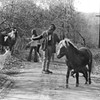Published April 23, 2003 at 4:00 p.m.
It's an essentially existential query: "Who knows?" But Va Savoir, the idiomatic title of Jacques Rivette's 2001 romantic roundelay, foregoes the question mark. The septuagenarian director is French -- tantamount to a capital offense in the United States these days -- and his lack of punctuation might be a subtle European way to suggest there rarely are any answers. The central concern of this poignant comedy, screening at Middlebury College on Saturday at 3 and 8 p.m., is the difficulty of sorting out emotions when it comes to love and lust.
The search for clarity is evident from the moment the film begins with Camille, an actress played by Jeanne Balibar, muttering about her confusion in matters of the heart. She's back in Paris with an Italian theatrical troupe three years after leaving the city to escape the smothering affection of Pierre (Jacques Bonnaffe), a philosophy professor who might be her true soul mate.
That's precisely what worries fellow thespian and company artistic director Ugo (Sergio Castellito), Camille's current main squeeze. The key setting is a theater where his ensemble performs a Pirandello play, in which she stars.
Pierre, meanwhile, has been living with Sonia. Portrayed by Marianne Basler, the woman is a former jewel thief now teaching ballet. She in turn is wooed by n'er-do-well Arthur (Bruno Todeschini). This rogue has an apparently semi-incestuous relationship with his half-sister Dominique (Helene de Fougerolles), who becomes enamored of Ugo. Arthur later develops a crush on Camille.
Such entanglements are not necessarily just the stuff of fiction. I can recall a similar chain of fools, so to speak, at my college: Ted was adored by Wendy, who was adored by Jim, who was adored by Linda, who was adored by Andy, who was adored by Paula, who was adored by Robert, who didn't yet realize he was gay.
In the realm of motion pictures, the Ugo-Camille-Pierre-Sonia-Arthur-Dominique connection never demeans its impossibly attractive participants. Collectively, they are the source rather than the butt of a laughable human dilemma.
The plot is completely breathless, despite the movie's 154-minute running time. Rivette -- perhaps most famous in his long career for Celine and Julie Go Boating -- was a leading proponent of the French New Wave along with auteurs such as FranCois Truffaut, Jean-Luc Goddard and Eric Rohmer. Va Savoir is quite Rohmer-like, in fact, with a cast that more or less drifts from one ardent encounter to the next. That drifting often relies on the entrances and exits associated with stagecraft, a purposeful blurring of the line between dramaturgy and cinema.
Although his tormented characters are allowed a sense of resolution, Rivette seems to point out that life itself remains unknowable. As the closing credits roll, Peggy Lee is heard singing "Senza Fine." In Italian, that means "without end."
Iraq bears little resemblance to Vietnam, but some of the vocabulary from our Indochina intervention has been resurrected. For one thing, today there's talk once again about "winning hearts and minds" -- and look where that got us three decades ago.
The Quiet American, a powerful film that opened in Burlington last week and will start soon at the Savoy Theater in Montpelier, conveys the earliest chapters of a war that was fated to last for 10,000 days. Philip Boyce directed this adaptation of Graham Greene's exquisite 1955 novel, in which Southeast Asia is as maddeningly elusive a region as the Persian Gulf. It takes place in an era when the French military, preparing to quit the indomitable peasant nation, has fallen victim to the self-delusion that will later haunt the Yanks.
Thomas Fowler is a British correspondent covering the hostilities along with a pack of international journalists who gather at Saigon's Continental Hotel, just as contemporary media have favored Baghdad's al-Rashid in 1991 and the Palestine Hotel in 2003. He lives with a much younger local woman, Phuong, and smokes a good deal of opium to assuage his world-weariness. Fowler sobers up quickly when Phuong falls for a Boston native named Alden Pyle, a covert operative trying to force his notion of democracy on the populace.
Michael Caine gives Fowler a bit too much bravado; in the book, the journalist retains that upper-class English reserve filtered through a devastatingly dry wit. Brendan Fraser is appropriately boyish as Pyle, yet fails to create a convincing duplicity. Symbolically, this is supposed to be a quiet American who leaves terrible desolation in his wake.
More By This Author
Speaking of Movies
-

Next Month Brings the Final Curtain for Palace 9 Cinemas
Oct 27, 2023 -

Book Review: 'Save Me a Seat! A Life With Movies,' Rick Winston
Aug 30, 2023 -

Steve MacQueen Named Executive Director of Vermont International Film Festival
May 22, 2023 -

Vermonters Are Going Back to the Movies — Under the Stars
Aug 26, 2020 -

Where to Catch a Movie Near Burlington
Sep 11, 2018 - More »
Comments
Comments are closed.
From 2014-2020, Seven Days allowed readers to comment on all stories posted on our website. While we've appreciated the suggestions and insights, right now Seven Days is prioritizing our core mission — producing high-quality, responsible local journalism — over moderating online debates between readers.
To criticize, correct or praise our reporting, please send us a letter to the editor or send us a tip. We’ll check it out and report the results.
Online comments may return when we have better tech tools for managing them. Thanks for reading.









































